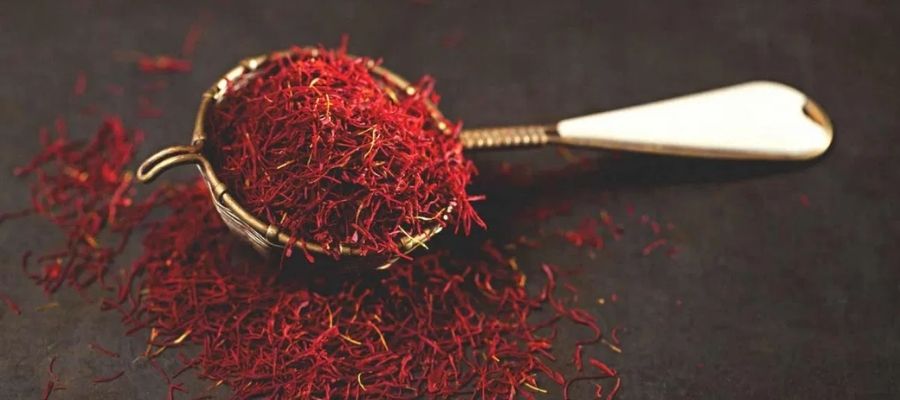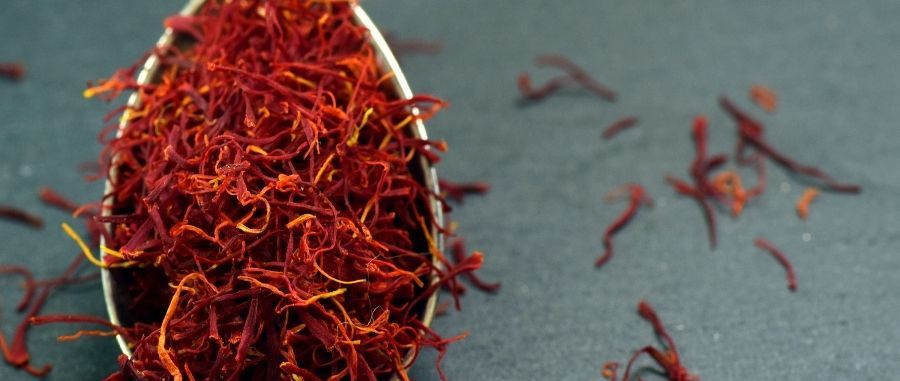Saffron, which looks like a red thread, is considered world’s most expensive spices. This is the reason why saffron is also called “Red Gold”. It is known for enhancing the taste of food. In addition to this, it plays a vital role when it comes to beauty and skin care. In this article, we will discuss proven benefits of saffron for the skin. This article will also brief the use of saffron for the face. So for complete information, read this article till the end.
WHY IS SAFFRON BENEFICIAL FOR YOUR SKIN?
The benefits of saffron for skin are many. Its use can be considered beneficial for many skin-related problems. According to a research, saffron has been found to be beneficial for keeping the skin soft and well-moisturized. In addition, saffron has also been considered effective for making the skin glowing and improving its complexion.
Along with this, saffron also protects the skin from sun’s harmful UV rays. It is also considered beneficial in other problems associated with the skin such as eczema, acne, psoriasis and skin wounds.
BENEFITS OF SAFFRON FOR SKIN AND FACE:
The benefits of saffron are many for the skin. Here; we are going to reveal some proven benefits of saffron for the skin. Keep in mind that saffron cannot cure any serious skin related problem, but can prevent or relieve its symptoms. So lets dive in.

1. In Dark Circles:
Saffron has been used as a herbal medicine since years. According to a study, saffron is considered effective to reduce the problem of dark circles to some extent.
Although, which property of saffron is worked behind this, it is still a matter of research, but it is also known to improve skin complexion. On this basis, it would not be wrong to say that its complexion-enhancing properties can help reduce the problem of dark circles.
2. Reduce Inflammation:
The benefits of saffron can also be seen here. According to a scientific study, it has anti-inflammatory properties which help reduce inflammation on the body.
In addition, saffron also has antioxidant properties. This property can work protect your skin against oxidative damage.
3. Protect Against UV Rays:
Saffron can work as a natural medicine on the skin. It has anti-solar properties, which help absorb the harmful UV rays of the sun. This is the reason why saffron is also used in many beauty and skin care products.
For this reason, you can use saffron as a beauty treatment to protect your skin from UV rays during summer.
4. In Hyperpigmentation:
The problem of hyperpigmentation can be due to the exposure to the sun. During this, the melanin cells of the skin, that are responsible for making melanin, start producing more melanin. In this situation, the unbalanced production of melanin can be the cause of hyperpigmentation or dark skin tone.
At the same time, saffron contains a compound, called safranal, known for having the property of reducing pigment. On this basis, it can be assumed that saffron can help in the problem of pigmentation.
5. In Acne:
When it comes to acne relief, saffron can help to a great extent. It contains a compound that can be effective on the problem of pimples and acne.
6. Aids in Wound Healing:
The benefits of saffron for skin can also be seen here. It can play a vital role in healing the wounds of the body.
It contains anti-inflammatory and antioxidant properties. And; according to a study, saffron can be extremely effective on mild burn wounds. However, keep in mind that it can affect minor wounds.
7. For Glowing Skin:
If you want radiant and glowing skin, then saffron can help. It contains two compounds, called crocin and crocetin. These two have antioxidant properties, which can work for brightening the skin.
Apart from this, saffron also contain an another compound, called safranal. It can also be helpful in improving the skin tone. In such a situation, it can be said that saffron can be beneficial to get glowing skin.
8. For Tanning:
Saffron is often used to lighten the skin. It has sunscreen and moisturizing properties. These agents can have a lightening effect on the problem of tanning caused by the harmful effects of the sun.
At the same time, we have already discussed in the above section of the article that saffron contains a compound called safranal, which works to lighten the skin complexion. On this basis, it can be presume that the lightening property of it can be effective in reducing tanning.
HOW TO USE SAFFRON FOR FACE AND SKIN?

To grab the maximum benefits, it is necessary to use saffron on face in the right way. Below we are providing information while using saffron on the face in different ways.
- You can use saffron on the skin by mixing it with rose water.
- Mix 2-3 pieces of saffron in a teaspoon of milk. Now apply it on the face with the help of a cotton ball.
- To enhance the beauty of the skin, make a thick paste by mixing 5-6 saffron strands in rose water and spoonful of sandalwood powder. Apply this mixture well on your entire face. It will help moisturize the skin as well as make it glowing.
- For glowing skin, take 5-6 saffron pieces, then mix it in 2 teaspoons of milk powder. Now; make a paste by mixing a small amount of water. After this, apply it on the skin similar to a face pack. Then wash the face with normal water.
- If you want, you can also consume saffron milk.
- Make a paste by mixing 2 teaspoon of honey, 2-3 drops of milk, 1/2 teaspoon of sandalwood powder in 3-4 pieces of saffron. It will help reduce tan.
SIDE EFFECTS OF USING SAFFRON ON FACE:
Saffron is an effective beauty treatment. But; sometimes it can also have some side-effects. Although these side-effects are negligible, but it is good to take precaution while using saffron on face and skin. Side-effects may include:
- It can cause allergic reactions.
- Applying it to sensitive skin can cause redness, or even a mild rash.
- If consumed in excessive amount, it can be harmful for health.
PRECAUTIONS TO BE TAKEN BEFORE USING SAFFRON ON SKIN:
Some of these precautions should be taken before using saffron on the skin:
- To avoid the side-effects of saffron, do a patch test before applying it on the face.
- If using saffron oil on the skin, then it is recommended to use it by mixing it with carrier oil such as coconut oil, almond oil or olive oil. Also do a patch test as well.
- While purchasing, check its quality. Sometimes there is a possibility of adulteration in it.
TAKE AWAY
Now; you must come to know the benefits of saffron for the skin. In addition, you have also learned about the different ways to use saffron on the face and skin.
FREQUENTLY ASKED QUESTIONS (FAQs):
Q. Can saffron be applied directly on the skin?
A. By applying saffron threads directly on the skin, they will not stick to the skin and its properties will not be able to be absorbed into the skin. Therefore, it is better to mix saffron with milk or any face pack mentioned in the article.
Q. Does saffron darken the skin tone?
A. No. Saffron does not darken the skin tone. It is used to improve and lighten the complexion of the skin.
Q. Can I add saffron to my body cream?
A. Yes. Saffron can be mixed with body cream. At the same time, to get its better effect on the skin, you can adopt any of the methods of using saffron mentioned in the article.
Q. Can saffron make the skin glow?
A. Yes, saffron can make the skin glow.
Q. Does saffron remove dark circles?
A. Yes. Saffron helps remove dark circles.
Q. Can I apply saffron on the face overnight?
A. Yes, saffron can be applied overnight by mixing a couple of threads of it with a spoonful of water.
Q. Can saffron cure acne?
A. Yes, saffron can be effective on acne.
Q. Which saffron is best for face?
A. There are many types of saffron available in the market. But, Kashmiri saffron is considered to be the best and purest one.
REFERENCES:
- Saffron: A Herbal Medicine of Third Millennium; Hossein Hosseinzadeh; PMCID: PMC3957135, PMID: 24644431.
- Specific IgG antibodies (total and subclasses) against Saffron pollen: a study of their correlation with specific IgE and immediate skin reactions; Abdol-Reza Varasteh and Fatemeh Vahedi; PMID: 18094441.
- Clinical Applications of Saffron (Crocus sativus) and its Constituents: A Review; M Moshiri, M Vahabzadeh and H Hosseinzadeh; PMID: 24848002.
- Does Saffron Have Antisolar and Moisturizing Effects?; Shiva Golmohammadzadeh and Mahmoud Reza Jaafari; PMCID: PMC3862060, PMID: 24363719.
- Therapeutic effects of saffron (Crocus sativus L.) in digestive disorders: a review; Alireza Rezaee Khorasany and Hossein Hosseinzadeh; PMCID: PMC4923465, PMID: 27403251.
- The effects of Crocus sativus (saffron) and its constituents on nervous system: A review; Mohammad Reza Khazdair and Mohammad Hossein Boskabady; PMCID: PMC4599112, PMID: 26468457.
- Clinical Applications of Saffron (Crocus sativus) and its Constituents: A Review; M. Moshiri, M. Vahabzadeh, H. Hosseinzadeh.
- Toxicology effects of saffron and its constituents: A review; Hasan Badie Bostan and Soghra Mehri.
- Oxidative stress and skin diseases: possible role of physical activity; Joanna Kruk and Ewa Duchnik; PMID: 24568458.
- Hyperpigmentation 2; Medline Plus.
- The effect of saffron (Crocus sativus) extract for healing of second-degree burn wounds in rats; Ghasemali Khorasani and Seyed Jalal Hosseinimehr; PMID: 19110531.
